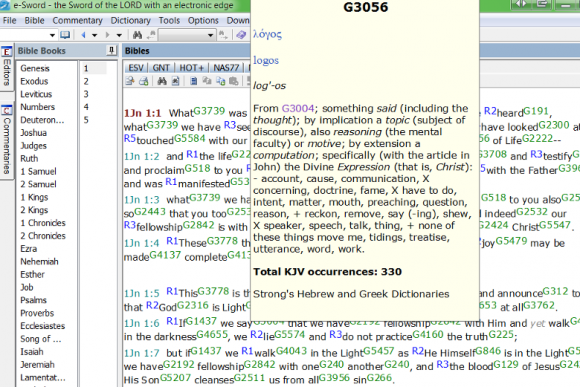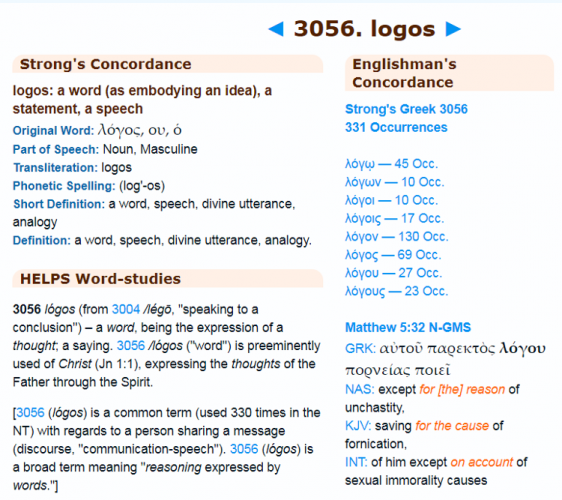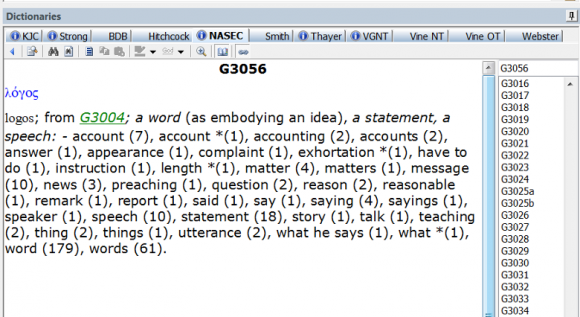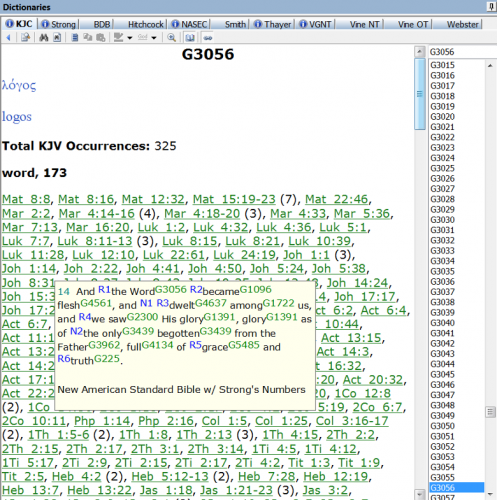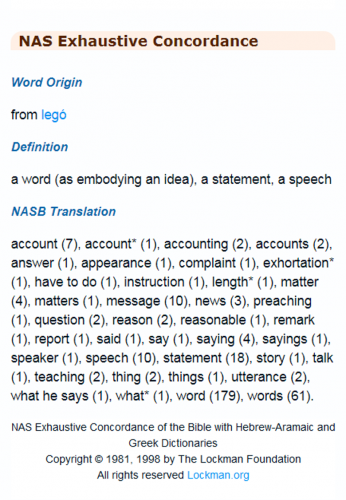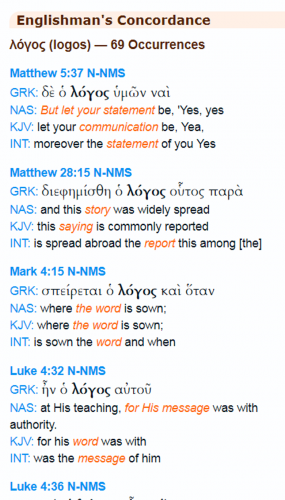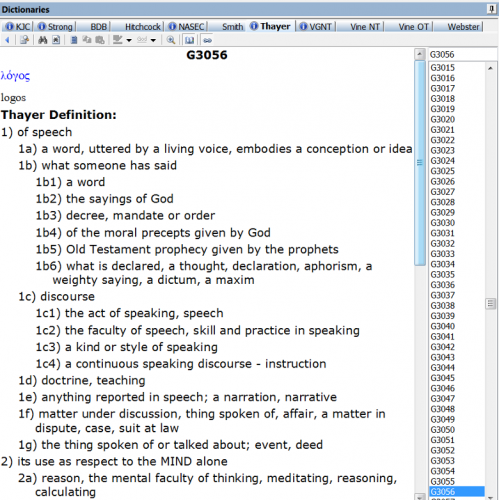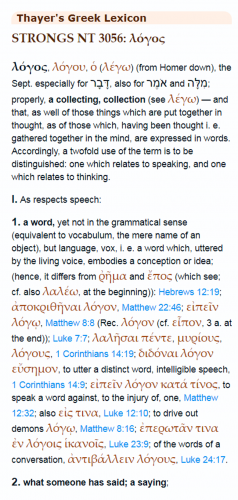- A single word by itself conveys very little: it is seldom an adequate guide to a biblical idea. Thus a word like “holy” needs to be studied in its various contexts if we are to discover what the full biblical idea of holiness is. Word study is only valuable as a means of pursuing a given theme: it is only a means to an end. Ideas not words are our goal, and few ideas are tied to a single word.
- Since the Bible was not written in English and no translation is perfect, words in the English Bible can represent two or more different words in the original language and the range of meanings in one English word does not do justice to the complexity of the original. The word study tries not only to get at the meaning but also the thought processes of the Hebrew or Greek authors. The context should indicate the meaning of the word being studied. The word study should be based on the Hebrew and Greek originals.
The purpose of a word study is to discover the themes of biblical thinking and not as a mere linguistic or lexicographical exercise. There are a number of strategies to be followed in order to ensure a productive approach.
Strategies for Doing Word Studies
A number of learning strategies are necessary in order to conduct a word study successfully:
- Learn Hebrew and Greek (see Guides # 2, 9, 16 and 17 in this series)
- Use an Analytical Concordance
If you are unable to learn Hebrew and Greek, the next best alternative is to consult an analytical concordance. For example, there are:
Robert Young, Analytical concordance to the Holy Bible. (Nashville: Nelson, 1982). Newly revised and corrected edition. BS 425 Y7 1982 TRIN/WYC, TRIF/WYC.
The best known and most useful, based on the Authorized Version (AVE) lists the occurrences of each English word under the various Hebrew and Greek words (transliterated) which that word translates. An appendix lists all the English words used in the AVE for each Hebrew and Greek word. It contains about 311,000 references, subdivided under the Hebrew and Greek originals with the literal meaning and pronunciation of each. It also has index lexicons to the Old and New Testaments, with a guide to parallel passages and a complete list of scripture proper names. So without knowing a word of Hebrew or Greek it is possible, by using this source, to trace the use of any word of the original.
J. Strong, The new Strong’s exhaustive concordance of the Bible (Nashville: Nelson, 1996). BS 425 .S76 1996 TRIF.
It covers the AV and the Revised Version (RV) making it possible to discover the meaning behind words which, though identical in English, are different in the original. As well as the Main concordance, it provides the New Strong’s concise dictionary of the words in the Hebrew Bible, with their renderings in the King James Version, and the New Strong’s concise dictionary of the words in the Greek Testament, with their renderings in the King James Version.
- Compare Different TranslationsThis is a useful way of getting the real meaning of the word or phrase, as each translation brings out a different facet of its meaning. However, some translations paraphrase too freely which may result in a departure from the emphasis of the original.
- Use New Testament and Old Testament While classical and popular Greek shed light on the meaning of New Testament (NT) words, the main source is still the Old Testament (OT). Thus NT use of a word should not be studied in isolation as it will be considerably illuminated by its usage in the OT.
- Choose Words Carefully Choose the words you wish to study carefully. Words such as “love”, “law”, or “faith” have an obvious value in terms of their doctrinal and devotional significance. Ordinary words such as “rock”, “fruit”, “white” also have their value for while they may appear mundane they can potentially have a metaphorical use or as illustrations of spiritual truth. Whatever the word we choose it is important that it be read in context in order that we understand what the author meant to convey. At the same time, one needs to respect what the author intended to say and not to assume allegory or metaphor where it was not intended. Let the context decide the meaning not preconceived usage determined by tradition.
Searching Using the Strong’s Numbering System
If you do not have a grasp of Hebrew or Greek, you can still search for terms in these languages by using the Strong’s Numbering System.
- These numbers are available only by selecting the KJV text.
- To get the Strong number of a word, search here. Select book, chapter, and verses. Then select “Show Strongs Numbers.” This will give you the Hebrew Strong number for the Old Testament and the Greek Strong for the New Testament.
- Make a note of all of the numbers you wish to search, remembering which are from the OT and which are from the NT.
- Then insert your choice of Strong Numbers individually in the box below your original search, specifying Hebrew (H) or Greek (G). Then select Search and view the results.
- The results will provide information on transliteration, pronunciation, root word, outline of biblical usage, and a listing of the occurrence of the word througout the books of the Bible.
Example of a Word Study: “Fellowship”
- Under “fellowship” we find one main word-group, koinonia (abstract noun), koinonos (concrete noun= ‘sharer’), koinoneo (verb).
- An index of Greek words shows that koinonia is variously translated as ‘communication’ (used once), ‘communion’ (4 times), ‘contribution’ (used once), ‘distribution’ (used once), ‘fellowship'(12 times).
- koinonos and koinoneo yield a similar range of translations, though ‘partaker’ and ‘partner’ occur as noteworthy additions.
- To be comprehensive, each of the terms in the koinonia group should be searched under the English equivalents listed. However, restricting this to ‘fellowship’, ‘communion’, ‘partaker’, and ‘partner’ is likely to save time and produce more relevant results.
- From this it emerges that koinonia is not primarily something that you do but rather signifies a state of affairs understood by the word ‘partnership’. It means sharing, belonging together, togetherness. Those who have become God’s people by faith are joined at the deepest level. They have koinonia with Christ and with God.
- In the context of the NT, koinonia can be a matter of money. Christians are intended to share not only in spirit but in kind. In the NT, 10 out of 45 occurrences of the word refer to this material aspect of sharing; and 5 others make it likely that it was being referred to.
Relationship of a Word Study to Analysing a Passage
How does a word study relate to the analysis of a passage? A word study is only one element in the broader study of a passage. Repeated readings of a passage (even from different versions) are a necessary prerequisite to any detailed examination of the text. It is important to identify the type of passage (e.g. poetry, prose, history, argument) before proceeding as this will determine one’s approach. For example, the literal meaning might be useless where passages in the Psalms are concerned (e.g. Ps.60:7). The following elements are to be recommended when exegeting a passage:
- Establish the main theme and summarize it in a single sentence or short phrase.
- Determine the principal divisions of the passage based on the main paragraphs and their subdivisions (if applicable).
- Identify connecting elements or links between paragraphs.
- Note the imagery used to explain difficult or abstract ideas.
- Note the use of repetition for the sake of emphasis.
- Note the key words for a word study.
- Identify the character(s) mentioned and connect this information about what you know of them elsewhere in the Bible.
- Note the questions raised by the passage. Often the crucial question will relate to the main theme. Note the questions raised in one’s own mind. Does the passage itself answer these questions?
- Explore and note cross-references. For example, in a study of Psalm 73, compare the theme of the prosperity of the wicked in the Book of Job and Psalm 49.
- Note the presence of any particular literary features like unusual word order, rhythm, figures of speech, and imagery.
Acknowledgement
In the preparation of sections of this guide, I have drawn on J. Rutherford, “Analysing a Passage” and D. France, “Word Study” in J.B. Job (ed.), How To Study the Bible (Downer’s Grove, IVP: 1979), 35-45, 54-64.
Tom Power Feb.2002. Revised Nov., 2012.
Have you ever considered doing a word study to better understand Scripture? Words are powerful. They often hold the keys of life or death. They can build us up with gleaming rays of encouragement or tear us down into heaps of defeat. If one word has the ability to wound or heal, then the Word of God certainly has the power to transform entire nations.
I will never forget the day one word within the pages of scripture dramatically changed my life.

I was reading the book of Isaiah and came across a verse I never really noticed before. A particular word jumped out at me in a way I’d never previously considered. It was the word was splendor.
Awake, awake, Zion,
clothe yourself with strength!
Put on your garments of splendor,
Jerusalem, the holy city…Shake off your dust;
rise up, sit enthroned, Jerusalem.
Free yourself from the chains on your neck…Isaiah 52:1-2a
Tears filled my eyes as this truth sank deep into my soul. It were as if God sat down next to me and tenderly said,
My daughter, you have lived in captivity for too long. Rise up, sit enthroned, my precious one! Take off your attire of shame and defeat, and clothe yourself in my strength. Put on your garments of glittering splendor. You are royalty. You are redeemed, and you are free!

That day, I discovered that I am clothed with sparkling spiritual garments of beauty, brilliance, and glory. Before this discovery, I knew that God loved me–but that day I experienced His love like never before.
I decided to investigate the meaning of the word splendor even further, and was blown away by what I found. As I studied the definition of splendor and the Scriptures throughout the Bible containing this word, I saw a distinct theme.
God Himself is clothed in majesty and splendor, and has removed our tattered clothing of sin and shame. Through Christ, we are now clothed in His righteousness and holiness–in His garments of splendor. I was so blessed by this passage that I started my blog Garments of Splendor, and now walk in a newfound freedom I found in Christ.
This all occurred because of the power of one word.
I discovered that understanding specific words in Scripture through the word study Bible study method has the power to radically transform lives. I now implement word studies as a regular part of my Bible study and devotion time.
Related: Check out this post with 14 Powerful Bible Study Methods to deepen your faith!
What is a Word Study?
A word study is a Bible study method that involves studying a particular word within the context of Scripture. Here are five steps you can implement to do your own word study to dive deeper into the life-changing truths of God’s Word!
1. Choose a Word
If there is a word you come across while reading your Bible that you would like to study in more depth, write that word down. Many people during the new year like to choose one word to focus on–words like grace, hope, favor, or flourish. There are so many sparkling jewels within Scripture to discover!

2. Define the Word
We can often assume we understand the definitions of common words we hear in Christian circles, but there is great value in giving many of these words a second glance. These definitions give us greater understanding of particular passages in scripture, further illuminating God’s messages of love and hope.
When you do a word study, write down the full definition of the word you are studying. Use sites like dictionary.com, and write down the synonyms that broaden your insight of the word. I also like to use blueletterbible.org look up the words in the original Greek or Hebrew. I look up a Bible passage containing the word I am studying, and click on the box that says “tools”.
It will give you the English words of each passage in either Greek or Hebrew. (Hebrew is the language of the Old Testament, and Greek is the language of the New Testament ). You can then click on the numbers next to the English word, and it will give you the definitions in Greek or Hebrew. The powerful definitions in the original languages of Scripture can give us even greater depth into God’s Word. Here is a screenshot of a passage I looked up in the book of Proverbs.

3. Read the Word
Find other Scriptures that contain the word you are studying. I like to go to biblegateway.com to find Bible passages. (For example, if you are doing a word study on the word grace, you can type that word in the search bar, and you will receive a list of all the Scriptures that contain that word.)
Choose a few scriptures, and read them each in the full context of the surrounding passages. Choose your favorite translation, and dive in!
4. Write the Word
Write down at least one of the Scriptures you have looked up in a journal or notebook. There is great power in writing God’s Word! There is something very meaningful about writing down scripture word-for-word that helps us slow down and digest each word at a time. If you like, highlight each time the word you are studying is mentioned in the passage. After writing down the Scripture, feel free to write down any of your observations and reflections.
5. Pray the Word
This is one of my favorite parts of doing a word study. Based on the new insights you have learned doing your word study, write a prayer to God, praising Him and proclaiming His goodness! Praying the Word of God is a wonderful way to draw closer to the heart of God.
Have you done a word study lately? Do you have a word you are focusing on this year? I’d love to hear in the comments below! It’s time to allow God’s Word to penetrate our hearts and permeate our souls in greater depth. God’s Word is so powerful that we can even be transformed with one single word!
Here is a printable that you can download to do your own word study–just click the button below to download!

You can also check out the other word study sheets, prayer journals, planners and faith stickers in my shop to help you grow in your faith, one word at a time!

Join the Prayer Challenge!
Looking for ways to go deeper in your prayer life? Join the Bold Prayers of Jesus Challenge! In this email prayer challenge you will receive a prayer guide, a prayer journal, Scripture cards, prayer prompts, and Scripture reading plan, and more!

In a previous tip on Bible concordances, I showed you how to do a simple word study. I also promised to teach you how to do more advanced word studies. Well, today is that day. This week’s Bible study tip is all about the in’s & out’s of word studies.
We have a lot to talk about, so let’s jump right in!
Why Do a Word Study?
If we already have the Bible in a language we can understand and study, what’s the point of word studies? Here are a couple reasons.
First, the meaning of words change with time. Most of us only understand a word’s meaning in its current context. But, what did that word mean 100 years ago? For example, we can no longer assume the word “bad” means something of poor quality; nowadays it can mean “good” depending on its context. Consider the King James Version of the Bible. An English word you’re reading in the KJV might mean something completely different to the original translators than it does in modern English (visit KJVquiz.com to see what I mean). Thus, when it comes to Bible study, we must make it our goal to understand what the word meant to the biblical author and how they used it.
Secondly, translating the Bible is a difficult job and there’s not always a clear translatable equivalent. An example of this is the German word blitzkrieg, which has no real English equivalent. Instead, we use the German word without finding a comparable English word. This is one reason why we have so many modern translations of the Bible. Our language remains in flux, so translators work to find the best way to communicate what the biblical authors wrote in modern language. So, if you want to best understand what a word means you should turn to the original languages and do a word study.
The ultimate goal behind Bible word studies is to get a grasp on biblical concepts that you would not simply get by reading the Bible alone. Click To Tweet
The ultimate goal behind Bible word studies is to get a grasp on biblical concepts that you would not simply get by reading the Bible alone. Digging into the words behind your English Bible can provide the knowledge needed to build better biblical understanding.
Word Study Prerequisites
When it comes to the process of doing a word study, there are two routes you can take: basic & advanced. The first is a basic word study, which is perfect for those who are first entering the realm of word studies. The three step process outlined below will give you everything you need to do a word study. And like most things in life, learning to do a basic word study gives you the building blocks necessary for doing advanced word studies.
If you’re going to get the most out of your word studies, there is one important tool you need: patience. As you’ll see in the steps below, word studies are not difficult. Most of the work involves looking up lots of Bible verses and doing lots of reading. This means word studies are time consuming. But, if you are patient, your time spent doing word studies will always be fruitful and increase your biblical understanding.
Throughout this study I will highlight various tools & how you can use them to conduct a word study. This tip is quite lengthy, so if you’re only interested in basic word studies, feel free to read that section & skip the advanced steps. So, without further ado, let’s get started with a basic word study.
When doing word studies, the most important skill you need is patience. Click To Tweet
Basic Word Study
Step 1: Find a Word to Study
The first step in a word study is finding the right word to study. The right word is dictated by your study. As you read through a passage of Scripture, a word or two will catch your eye & pique your curiosity. When that happens, you’ve found a word worth studying.
In 2010 I was preaching through 1 Thessalonians. As I studied the second chapter, a phrase in verse 4 caught my attention & made me pause: “we have been approved by God.” The word “approved” seemed awkward, so I investigated further. We will use my study of this word to illustrate each step in the process.
Once we’ve found a word to study in our English Bible, we need to find the underlying Greek or Hebrew word so we can dig deeper. In the Olive Tree Bible app this means switching from the standard ESV Bible to the Strong’s tagged ESV. With the Strong’s Bible open, we can tap on the word “approved” in verse 4. The popup shows that we are dealing with the Greek word δοκιμάζω (dokimazō), which is Strong’s number G1381.
We now have all the pieces we need to begin our word study.
Step 2: Consult a Strong’s Dictionary or Lexicon
Our next step is to look up the Greek word in a dictionary or lexicon. We’ll use the Strong’s number (or GK number if you’re using the NIV) to help us find the word. Thankfully, Olive Tree makes this step easy because everything we need is in the popup (see the screenshot above).
This step provides us with some preliminary information about the word in question. Here we find it’s meaning, some basic glosses (English translations), as well as the number of times the word appears in the Bible. While not elaborate, this information primes the pump before moving to the next step.
In this case, Olive Tree’s Strong’s dictionary shows us that dokimazō means “to test, examine, prove, scrutinize” or “to recognize as genuine after examination, to approve, deem worthy.” We will keep this information in mind as we move to our next step.
Step 3: Find All Occurrences
The final step is to find all occurrences of our word in the Bible. This step will give us a broader understanding of how dokimazō is translated in our English Bible. This step is easy in the Olive Tree app. With the popup still open, all we have to do is tap the “Search for g1381” button, and it’ll search the ESV Strong’s Bible for every occurrence of dokimazō based on its Strong’s number. Our search shows there are 22 occurrences in 20 verses.
Alternatively, you could do this with a Bible concordance by looking up the Strong’s number and finding all its results.
With all occurrences found, now our task is to read every single verse where dokimazō is found. After reading through each verse, we find that dokimazō has to do with the idea of examining or testing something, which aligns with our definition in step 2. This word is mostly found in Paul’s writings and refers to examining one’s self. In the case of 1 Thessalonians 2:4, note how God is the one approving or examining Paul and his co-laborers for the work of ministry. Additionally, the Strong’s lookup shows that dokimazō is used twice in this verse. This isn’t obvious in the ESV because the second time it is translated as “tests.”
Just a simple search of the word in our Bible has uncovered a wealth of information and gives us a better understanding of how the Bible’s authors used the word, as well as how it fits with our phrase in question. At this point, we have successfully completed our word study. We have uncovered the lexical range of dokimazō in the New Testament and now have a general knowledge of the Bible’s teaching on testing or approving something.
That’s all there is to a simple word study. If that’s enough for you, you can skip ahead. But, if you want to learn how to dig even deeper, let’s talk about advanced word studies.
Three steps to a word study: 1) find a word, 2) look it up in a dictionary, & 3) read all the occurrences. Click To Tweet
Advanced Word Study
A basic word study only scratches the surface of what you can uncover. There is so much more we can unearth that will expand our understanding of any biblical concept. If we’re willing to put in more work, we can see it our apprehension grow exponentially.
Note: to do an advanced word study, you’ll need to start expanding your Bible study library beyond basic Bible study tools. The tools used from here on out are specialized and are best used in Bible software.
So, if you’re ready to dig even deeper, let’s get started with the steps for an advanced word study!
Step 0: Do a Basic Word Study
Until we’ve exhausted our basic word study, we needn’t go any deeper. We’re not ready to move forward until we’ve looked up every single verse and made notes on how the word is used. It’s only after these steps are done that we’re ready to move on.
Step 1: Find Other Words Translated as Your Word
Our first step requires finding all the other Greek (and Hebrew) words translated as our English word. With our concordance this is a straightforward task. We will look up the English word and note all the Strong’s numbers used for it. Then we’ll do a basic word study for each new word.
I’ll be honest here. Depending on how many words I need to look up, I will only read a sampling of the verses. Our goal is to study these words as an extension, not to do a full word study on these derivative words. But, if you have the time, I would certainly encourage reading every verse.
In the case of our example, we would look up the word “approved” in our concordance. The ESV returns 14 verses using some form of the word “approve,” from seven (7) different Greek word, including dokimazō. So, in this instance, we would have six (6) additional words to lookup. Examining these Greek words also reveals there are several words that appear similar to dokimazō, as they include the doki- prefix. This takes us to our next step.
Step 2: Find Related Words
Language is built using root words that expand with the use of prefixes & suffixes. Often, these words share similarity in meaning, or at least can be seen how they derive from their root. For example, take the word “act,” which means to do something. From this root word we can make other words such as: activity, react, action, interaction, and so on. All these words imply doing some kind of action. The biblical languages work similarly.
With that in mind, the next step in our process is to find all words related to our Greek or Hebrew word.
We can accomplish our task a couple ways. The first method utilizes a more advanced Greek or Hebrew dictionary, such as the Theological Dictionary of the New Testament (TDNT), New International Dictionary of New Testament Theology & Exegesis (NIDNTTE), or Theological Lexicon of the New Testament (TLNT). Such dictionaries look at the Greek or Hebrew words in depth, examining their usage & theological implications throughout the Bible. One advantage of these dictionaries is how they group words together based on their root. Therefore, when you look up your starting word, you will find all its cognate forms.
Our second option is to use the power of Bible software, which I heartily recommend at this point in your study. One of the advantages of Bible software is everything is only a couple of taps or mouse clicks away. For example, Logos Bible Software has a feature in their software called the Bible Word Study Guide. This tool allows you to do a word study in a breeze by generating a full report on your word of study, whether it be English, Greek, or Hebrew. One of the reports generated by this guide is a “root” report. This report shows you the root word of the word you’re studying, as well as all other words derived from that root. So, instead of flipping through pages upon pages, the work is done for you (along with several other steps we’ll get to below).
When it comes to our Greek word dokimazō, it is in fact the root word. All the cognate words derived from dokimazō include:
- apodokimazō (reject)
- adokimos (unqualified or disqualified)
- dokimē (proven character)
- dokimos (approved or tested)
- dokimion (testing or genuine)
- dokimasia (trial, testing, or examination)
With this information in hand, we then repeat the steps of our basic word study with these words. And, of course, if you’re using a dictionary like the TDNT, make sure you take time to read the entries. This is an important step because they provide a wealth of insight that you would otherwise miss.
Are you getting the hang of it yet? You study a word, find more words, and repeat the process.
Step 3: Find Synonyms
The third step in the process requires us to find all the synonyms. Often times, we complete this step by working through the first two steps; but, sometimes there are some related words that can slip through the cracks. A book of Greek or Hebrew synonyms is the perfect tool to help you find these. My favorites are Trench’s Synonyms of the New Testament & Girdlestone’s Synonyms of the Old Testament. These resources provide a list of synonyms, as well as some theological insight on the words’ usage & similarities.
In this case, we did miss a word. Peirazō is a synonym for dokimazō, and it is yet another word we need to study.
The important thing about synonyms is we might want to study their cognate words as well, since they will likely have similar usage. This will not only round out our understanding, but give us a broader view of the concept we’re studying.
Step 4: Bridge the Testaments
Up to this point we’ve spent the majority of our time looking at either the Greek or the Hebrew. That only gives us a view of one side of the Bible. If we’re looking at a Greek word we’ve only spent time in the New Testament. What about the Old Testament?! That’s where the next step in the process comes in.
When we did our concordance work, we should have made note of any Old Testament references, as well as any related Strong’s numbers. This can serve as the foundation of our study in the other side of the Bible. Starting with those words, we’ll do more basic word studies.
Another method starts with our Greek or Hebrew word by way of the Septuagint. The Septuagint is a Greek translation of the Hebrew Bible, and it’s a translation that was familiar to the likes of Jesus and Paul. The advantage the Septuagint brings is we can lookup our Greek word among its pages, and then see the corresponding Hebrew words, and vice versa.
To be honest, searching the Septuagint is a task best left to Bible software because a concordance won’t help us. This is an especially easy task with Logos’ Bible Word Study Guide. With the necessary resources in our library, one of the reports generated is a “Septuagint Translation” report. This report lists all the Hebrew equivalents for any Greek word we’re studying, so long as it appears in the Septuagint. We can then take this information and lookup all the words and verses, again, using the steps above.
At this point, we’ve essentially exhausted everything we can glean from the Bible. Does that mean we’re finished? Nope! There’s one last step!
Step 5: Look Outside the Bible
If we’re studying a Greek word, there’s one more step we can take after exhausting the Bible. We can expand our search to extra biblical literature, using Bible software. There are several Greek writings in antiquity, many of which have relevance to the Bible or were written around the same time. Some of these writings include: the Early Church Fathers, Josephus, and Philo.
With a tool like Logos, these searches are generated for us as part of the Bible Word Study Guide. As we search these resources in their original languages, we can then read their corresponding English translations. When we do this, we get a wider sense of how the word was used outside the Bible.
I find this step to be helpful with words that only have a few biblical occurrences. When a word occurs less than a handful of times, it’s difficult to get a strong sense of its usage. Thus, this step can help broaden the horizon.
In terms of our study of dokimazō, it appears 20 times in the Apostolic Fathers and 38 times in Philo. Reading those instances would further round out our study.
Study Summary
After extensive reading, our understanding of dokimazō should be on par with what the dictionaries say. As it relates to our verse (1 Thessalonians 2:4), not only does God test people, like on the day of judgment (1 Cor. 3:13), but he is currently testing our hearts—specifically as it relates to our usefulness for ministry.
Advanced word studies require more work, but are just as simple as basic word studies. Click To Tweet
Word Study Tools
As we wrap up this Bible study tip, I want to leave you with some entry level resources you might find helpful in your own word studies.
Bibles
- Key Word Study Bible
- Complete Word Study Bible (OT & NT)
- Zondervan Greek and English Interlinear New Testament
- A Bible with Strong’s numbers (mostly available in Bible software packages)
Study Tools
- Exhaustive Bible Concordance
- Mounce’s Complete Expository Dictionary of Old and New Testament Words
- Vine’s Complete Expository Dictionary of Old and New Testament Words
- Theological Dictionary of the New Testament – Abridged
Bible Software & Online Tools
- Accordance
- BibleWorks
- BlueLetterBible.org
- Logos
- Olive Tree
If you have any questions about which resources to purchase for your library, feel free to email me, as I’m always glad to help.
It’s Your Turn
Now you know the in’s & out’s of doing a Bible wordy study. It might seem complicated, but it’s an easy & straightforward process once you get started. I’m sure once you get started doing word studies, you’ll have a hard time stopping. Just remember, be patient.
Your task this week is to find a word or two in your studies that you want to know more about, and then do a word study.
I’d love to hear how your studies went this week. Head over to our private Facebook group & tell us all about the word(s) you studied and what you learned in the process.
Weekly Study Prompts
This week, meditate and journal on the following passages:
- Monday – 1 Samuel 17-18
- Tuesday – 1 Samuel 19-20
- Wednesday – 1 Samuel 21-22
- Thursday – Psalm 22; 1 Samuel 24-25:1
- Friday – 1 Samuel 28; 31
- Memory Verses: 1 Samuel 17:46-47; 2 Timothy 4:17a
bible software, bible study tools, bible translation, concordance, essential, exhaustive concordance, word study

Word studies are one of the basic tools of Bible study. With today’s tools, you don’t have to know Greek and Hebrew to do a good word study. Here’s how.
And if you are really short on time, here are some shortcuts.
What you’ll need
In addition to a Bible, you’ll need either: 1) a physical concordance, dictionary and commentaries; 2) Bible study software; or 3) access to the internet to use the online tools.
Decide which words to study
To decide which words to study, read through the passage using 1 literal translation and 1 dynamic equivalent translation. Look for the words that are:
- crucial to the meaning of the passage
- difficult, obscure, or rare
- “religious” or profound
- were translated very differently in the different versions
Study these words. They may or may not be repeated.
Find the Strong’s number
The first step in doing a word study is to find the Strong’s Number for the word you want to study. Since each Hebrew or Greek word may be translated by several English words, or one English word may be used for several different Hebrew or Greek words, the Strong’s number ensures you have the right word.
You can find the Strong’s number through most Bible study software or a concordance.
- In E-Sword the translations noted with a plus (e.g. NASB+) include Strong’s numbering system in the text.
- On biblehub.com, type the verse into the Bible search bar. When you have your verse, under “Study Bible”, mouse over your word, the number in the pop-up is Strong’s.
- On blueletterbible.org, locate your verse with the search bar, then click on Tools, Interliner.
- On Strong’s Interlinear Bible Search, enter your verse number and search. Mouse over the word of interest The number that pops up is Strong’s number.
You may need to enable pop-ups in your browser to access these tools.
Find the etymology
Etymology traces the meaning of the word’s parts back to their earliest usage. Think of it as the history of the word’s meaning. For example, “etymology” comes from the Greek words etymos ( which means “true”) and logos (which means “word” or “reason”).
When researching etymology, our aim is to find the “lowest common denominator” or the basic concept that ties the word’s nuances together. But BEWARE: the etymology of a word is rarely, if ever, the current meaning of the word. Words change meaning over time and culture.
Procedure:
Find the Strong’s number for your English word and note the etymology. If your word comes from some other number(s), then check the etymological information under all the appropriate number(s). For example, “word” in 1 John 1:1 is G3056 which comes from G3004.
If you’re using a physical concordance, locate your English word in the verse in question. Then turn to the appropriate dictionary in the back. The etymology is usually found between the pronunciation help and the list of words used in translation (i.e. between the first “;” and the “:-“).
Using bible study software (like e-sword), navigate to the verse, click on NASB+ and click on the number. The etymology is usually located after “from…”
If you are using online software, like Strong’s online, the etymology is usually near the top and starts “from”.
Determine the range of meaning
Next, we want to learn how the word is used throughout Scripture. Our goal at this stage is to determine the word’s scope of meaning. In order to discern how the biblical authors used this word, we study the usage of a word throughout: 1) the passage; 2) the author; and 3) the rest of Scripture.
If this process seems overwhelming, break it down into sections, starting small and working outward until you “get it.”
- First study the word in the passage.
- Then, in the chapter or book.
- Then, the author’s other writings.
- Then in the rest of Scripture.
- Then, in the Septuagint.
- Finally, in sources outside the Bible, including classical Greek or Aramaic.
Procedure:
Use your Strong’s number to find all the places that word is used in Scripture. Find all the English words which translate your word and all the verses where your word is used. Watch for recurring ideas, general categories of usage, synonyms, antonyms, recurring words or phrases used with your word, etc. Ideally, you should check all the English words used to translate your word.
If you’re using a physical concordance, note all the Scripture references with that number and then look them up.
If you’re using e-sword, under your Dictionary Tab, check Strong’s and your concordance.
If you are using Strong’s online, type your number in the appropriate box (Greek or Hebrew), and check the concordances.
Check reference works
Having gathered an idea of the word’s meaning from your own study, it’s a good time to check the conclusions of other scholars and reference works. Our goal is to refine, as closely as possible, our understanding of the word. People have been studying Scripture for over 2000 years. Someone before us must have figured it out, so let’s find it.
Procedure:
- Check Bible dictionaries, language lexicons, commentaries, etc. looking at how others define and summarize the meaning of the word. Read carefully and demand proof.
- It’s often useful to study the same word in the opposite language. For example, if your word is Greek, study the Hebrew word it translates and vice versa. All the New Testament authors (except Luke) were Jewish. Their understanding of Hebrew and the Old Testament often influences the Greek words they choose.
If you’re using e-sword, click through your dictionaries and commentaries.
If you are using Strong’s online, search through the dictionaries and commentaries.
Draw conclusions
Draw conclusions, taking all your work into account. Try the different nuances of a word’s meaning in your passage to see what makes the most sense in context, considering the implications of your conclusions.
Be prepared for any conclusion. Sometimes your study reveals the obvious (e.g. the Greek word for “fire” means fire). But usually your study reveals a nuance or level of meaning you would otherwise have missed.
Advice
- Words have different nuances and a large legitimate scope of meaning. No one word has 1 single meaning.
- Words are not necessarily used the same way throughout the Bible. Because Paul used mystery to mean “revelation” in one context, does not mean James means the same thing in his.
- Words are not necessarily used the same way by the same author. Paul may use “walk” in Ephesians differently than in Colossians.
- In any given text, a word does not mean all of its nuances.
Previous: 5Ws and H
Part of the Series: Bible Study 101
Photo used here under Flickr Creative Commons.
(This article has been read 3,264 times plus 7 today.)
The Bible wasn’t written in any modern day language, but it was written in every day languages of the times. For many of us ancient Greek and Hebrew can seem sacred or special, but for the people in biblical times it was what they spoke every day. Since most of us don’t speak either of those languages we rely on translations to help us read God’s Word in our own every day language. But it can be exciting to dig into the original language and gain a personal understanding of the words of the Bible. Our Slimline Center Column Reference Bibles offer you just that opportunity. They include over 200 Hebrew and Greek word studies throughout the Bible text. These word studies give readers a glimpse into the inner workings of the New Living Translation and open a small window to the original languages of the Bible.
How to Do Word Studies with the Slimline Center Column Reference Bible
While reading through the Bible text, you will find at various places a superscript letter attached to the front of an English word. In the cross-reference column, there is a transliteration of the Hebrew or Greek word or phrase that underlies the translation at that point, along with the Strong’s number(s) in parentheses and the location of the next reference in that Hebrew or Greek word chain. If you follow the reference chain, eventually you will read through all of the marked instances of that word or group of words in the entire study Bible. Doing so is a good way to begin doing Hebrew and Greek word studies.
Another way to use the tool is to systematically study a particular word from those listed in an NLT Slimline Center Column Reference Bible. In these Bibles we have listed and defined all of the words that are included in the Hebrew and Greek word-study chains. The references in the chains are selective and do not represent all of the places where a Hebrew or Greek word occurs in the Bible; we chose a limited number of instances in order to show the variety of usage for a given term or group of terms. If you want to do a complete study of a biblical word, it would be a good idea to read most or all instances, which you can find with Strong’s Concordance or a similar tool.
You can take your study of Hebrew and Greek words further by obtaining a copy of Strong’s Exhaustive Concordance of the Bible. Dr. James Strong first published his exhaustive concordance of the King James Version in 1890, and the system he created for referring to every individual word in Hebrew and Greek by a number has been tremendously helpful for English readers who want to do word studies in the original languages. The Strong’s numbering system has become the de facto standard for English language word-study tools. There is a wide variety of other publications and software tools available with which you can take your study of any Hebrew or Greek term further.
The dictionary and index in an NLT Slimline Center Column Reference Bible is organized using the Strong’s numbering system, named for the system used in Strong’s Concordance. For any word you find while reading the text, you will simply have to use the Strong’s number to find the brief definition and full chain. Please note that there are separate numbers and lists for the Hebrew words in the OT and the Greek words in the NT.
If you follow the entire word chain, note each context in which the word occurs and how it has been translated. You will get a good feel for the range of uses that each word can have, and you will get a unique glimpse into the inner workings of the NLT.
Hebrew and Greek Word Studies
Because the Bible was originally written in ancient languages that are quite different from our own, the Hebrew and Greek words of the original text are often seen as strange and wonderful. Sometimes, Greek and Hebrew words are portrayed as though they are somehow a special or “divine” language containing more significant meaning than normal languages like English. In truth, biblical Greek and Hebrew are normal human languages, with words that are similar to the words of any language.
Words are complex animals. Consider, for example, the word animal in the previous sentence. In most contexts, that word conjures up images of wildlife. In this particular instance, however, it means something quite different. Words have a dynamic relationship to meaning, neither confined to a dictionary entry nor free to mean anything at all. Few readers whose mother tongue is English would have misunderstood the meaning of the sentence, “Words are complex animals,” but it could certainly cause confusion for a reader whose knowledge of English is minimal.
When confronted with a word from any foreign language, especially an ancient one like the Hebrew or Greek of the Bible, people can misunderstand if they aren’t careful to study the word in a way that makes sense with how language is used. Some common mistakes that are made in studying words in the biblical languages include the following:
- Assuming a word means more than it does. When faced with the range of meanings a given word can have, sometimes interpreters are tempted to think that every instance of that word contains all of the possible meanings. While it is true that sometimes a writer will purposefully use a word to mean more than one thing, it is not common. Normally, a word has one meaning in a given context. For instance, the Hebrew zera‘ (2233) can mean “seed” or “offspring,” but only rarely would both meanings apply to one specific use of the word. An important part of original-language Bible study is to discern which meaning a term probably has in a given context.
- Understanding words by their roots. Many words share common roots, but this does not necessarily mean their meanings are related. The meaning of a word is related to how it is used in the language, not where it came from. The Greek ekkle¯sia (1577) comes from two words that mean “to call” (kale¯o) and “out of” (ek). This does not mean that ekkle¯sia means “called out of,” any more than the English word goodbye means “it’s good that you’re leaving.” It is important to understand the meaning of the word from its usage rather than its roots.
- Confusing synonyms. Many words share common meanings, or at least have very similar meanings in specific contexts. An example in English is “choose” and “select.” In many cases, the difference is negligible, and a writer could choose between them without changing the meaning at all. But in some contexts the selection is meaningful. In this tool, we sometimes string synonyms together in a single chain, but that does not mean they are completely interchangeable. Each word must be considered on its own terms in each context.
- Failing to appreciate the difference between words and concepts. Words are only tools to communicate meaning, so any one word will never be sufficient to get a complete picture of an important concept. If you want to understand the concept of “truth” in the Bible, Hebrew ’emeth (0571) is a good place to start, but to limit study to a word alone will miss important components of the biblical picture of truth. Each concept must be studied as whole, going beyond the study of words.
Check out our Slimeline Center Column Reference Bibles








